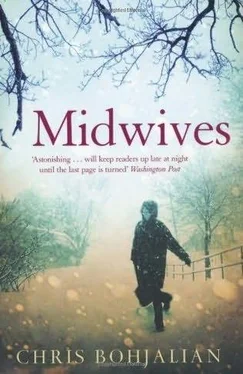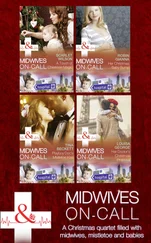Chris Bohjalian - Midwives
Здесь есть возможность читать онлайн «Chris Bohjalian - Midwives» весь текст электронной книги совершенно бесплатно (целиком полную версию без сокращений). В некоторых случаях можно слушать аудио, скачать через торрент в формате fb2 и присутствует краткое содержание. Жанр: Современная проза, на английском языке. Описание произведения, (предисловие) а так же отзывы посетителей доступны на портале библиотеки ЛибКат.
- Название:Midwives
- Автор:
- Жанр:
- Год:неизвестен
- ISBN:нет данных
- Рейтинг книги:5 / 5. Голосов: 1
-
Избранное:Добавить в избранное
- Отзывы:
-
Ваша оценка:
- 100
- 1
- 2
- 3
- 4
- 5
Midwives: краткое содержание, описание и аннотация
Предлагаем к чтению аннотацию, описание, краткое содержание или предисловие (зависит от того, что написал сам автор книги «Midwives»). Если вы не нашли необходимую информацию о книге — напишите в комментариях, мы постараемся отыскать её.
Midwives — читать онлайн бесплатно полную книгу (весь текст) целиком
Ниже представлен текст книги, разбитый по страницам. Система сохранения места последней прочитанной страницы, позволяет с удобством читать онлайн бесплатно книгу «Midwives», без необходимости каждый раз заново искать на чём Вы остановились. Поставьте закладку, и сможете в любой момент перейти на страницу, на которой закончили чтение.
Интервал:
Закладка:
We both expected that when we returned to school in the fall, the boys would begin to notice us. We weren't too tall, which was important, and we didn't have pimples. We were smart, which we knew would intimidate some boys, but not the sort we were interested in: Probably nothing, we thought, scared a boy like Tom Corts, and certainly not something as harmless as an interest in books.
And, fortunately, we looked nothing like each other, which we also assumed was a good thing: It would minimize the chance that the same boy might ever be interested in both of us, or we in him. We understood from our years of riding and playing together that we were a competitive pair, and the fact that I was a blonde and she a brunette, that I had blue eyes and she had brown, would decrease the chances that a boy would ever interfere with our friendship.
Or, as Rollie explained it that Fourth of July, "Boys look at us like we look at horses: color, height, eyes, tail. They can't help but have preferences." Her horse was a chestnut brunette, and in Rollie McKenna's cosmology of preference, this meant she would probably always prefer chestnut horses as long as she lived. Human nature.
That afternoon Rollie helped me plot ways to maintain contact with Tom Corts until school resumed in September and we would be together in the same section of the brick Lego-like maze that someone thought was a functional design for a school. Tom had a job that summer that I interpreted as one of those signals (like, in some way, his seemingly endless wardrobe of dark turtlenecks) that he wanted more from the world than the chance to fix cars in his family's beat-up garage, or to joust on motorcycles until the rescue squad had to rush him to the hospital with a limb dangling by a tendon. He was working for Powder Peak, the nearby ski resort, cutting the lawns around the base lodge where the company also had its offices, and assisting the maintenance crews as they tuned up the chairlifts and grooming machines. He was about to turn fifteen (just as I would soon turn thirteen), and he could have hung out at the garage with his brothers and father, he could have spent July and August smoking an endless chain of cigarettes with his brothers' and his father's friends, but he didn't: He hitchhiked up to the mountain every morning and found a ride home from an adult member of the crew every evening. And while mowing lawns and oiling chairlifts isn't neuroscience, the fact that he was doing it some miles from home suggested to me ambition.
Of course, it also kept him away from the village most of the time. And while Tom and I had kissed only once, and that one time had been three and a half months ago, I was sure we could have a future together if one of us could find a way to bring our bodies into a reasonable proximity. I was convinced that Tom hadn't tried to kiss me again for two simple-and, in my mind, reassuring-reasons. First, he was two years my senior, and therefore feared with the gallantry of a man who was kind and wise that I was too young to kiss on a regular basis. In addition, the fact that he was two years older than I was meant our paths simply didn't cross with any frequency-certainly from September through June, when we both attended the union high school but had a full grade between us as a buffer zone, and now in the summer as well, since he had an adult man's commute to the ski resort.
If Rollie wasn't as convinced as I that Tom Corts was my destiny, she at least agreed he would be a good boy to date. He was intelligent, independent, and cute. And since it would be no more likely for Tom's and my paths to cross in the fall, when he would be in the tenth grade and I in the eighth, Rollie believed we had to attempt to move the relationship forward in the summer. In her now barely thirteen-year-old mind, this meant simply being visible before Tom so he could again take some sort of initiative.
"The creemee stand," she suggested thoughtfully that afternoon. "You have to hang out at the creemee stand once you figure out when he goes there."
"I'm not going to hang out at the creemee stand. I'll get fat."
"You don't have to eat anything. You just have to be there."
"No way. I think I'd get sick inhaling all the grease from the French fries."
"You don't inhale grease."
"And I'd wind up with pimples."
"You probably will anyway as soon as you get your period."
"You didn't!"
"I wash my face seven or eight times a day. Every two hours."
"Then I will, too. What do you think I am, a slob?"
"I think you're making excuses not to run into Tom because you're shy."
"I don't see you going after anyone special."
"There aren't any boys I'm interested in right now."
I shook my head, as Foogie aimed the sprinkler at a vacant hornet's nest near the awning of the house. "I am not going to hang out at the creemee stand, it's that simple."
"Do you have a better idea?"
"The general store, maybe. He has to buy his cigarettes before he goes to the mountain."
"Or when he gets home."
"Right."
"You can't just hang out at the general store, you know."
"But I can be there when he is."
And so it went for most of the day. We were still outside, sitting on the front steps and awaiting the Bedfords' return, as the afternoon slowly gave way to evening. Through the living-room window we could hear Foogie watching reruns of old situation comedies on television, while crashing a plastic flying saucer over and over again into the plush pillows on the couch.
The stories that the attorneys and newspaper reporters would choose to tell-although in my mind, certainly not my mother's story-began that afternoon. The Bedfords arrived just before six, well after most barbecues in Vermont had begun to smoke but hours before the night sky would be lit by the glowing, spidery tendrils of fireworks. As the Reverend Bedford was paying Rollie (a fee she would share that day with me, although she was the official Foogie-sitter), Mrs. Bedford pulled me into the kitchen.
In a voice that was whispery and soft, in a tone that suggested she was discussing a vaguely forbidden subject, she inquired, "Your mother, Connie: Is she truly a midwife?"
Chapter 5.
I've helped birth the sons and daughters of two bakers, but no bankers.
My mothers have been painters and sculptors and photographers, and all sorts of people blessed with really amazing talents. Three of my mothers have been incredibly gifted fiber artists, and two hooked the most magical rugs I've ever seen in my life. When parents have been artistic but poor, I've been paid with quilts they've made themselves, and paintings and carvings and stained glass. Our house is beautiful because of barter.
And there have been lots of musicians among both my mothers and my fathers, including Banjo Stan. And Sunny Starker. And the Tullys.
There have been young people who farm, carpenters-probably enough in number to have built Rome in a day-wives of men who run printing presses, women who make jewelry, throw pots, roll candles from beeswax. If I look back through my records, I can find a few schoolteachers, a newspaper editor, journeyman electricians, a woman who grooms dogs, a man who cuts hair, the wives of auto mechanics, the husbands of laboring waitresses, a couple of ski instructors, chimney sweeps, roofers, pastors, loggers, welders, excavators, a masseuse, machinists, crane operators, a female professor, and the state's first female commissioner for travel and tourism.
But no bankers. No lawyers. And no doctors.
No people who make ads for a living, or fill cavities, or do other people's taxes.
No people, like Rand, who design houses or office buildings or college science centers.
Those sorts of people usually prefer hospitals to home births, and obstetricians to… to people like me. That's cool. They think it's safer, and while the statistics show that most of the time a home birth is no more risky than a hospital one, they need to do what's right for them. That's totally fine with me.
Читать дальшеИнтервал:
Закладка:
Похожие книги на «Midwives»
Представляем Вашему вниманию похожие книги на «Midwives» списком для выбора. Мы отобрали схожую по названию и смыслу литературу в надежде предоставить читателям больше вариантов отыскать новые, интересные, ещё непрочитанные произведения.
Обсуждение, отзывы о книге «Midwives» и просто собственные мнения читателей. Оставьте ваши комментарии, напишите, что Вы думаете о произведении, его смысле или главных героях. Укажите что конкретно понравилось, а что нет, и почему Вы так считаете.











